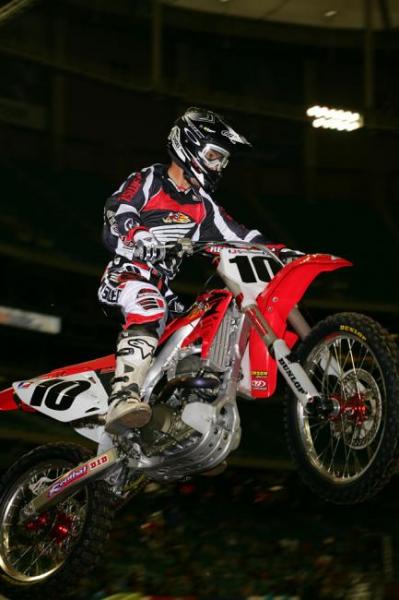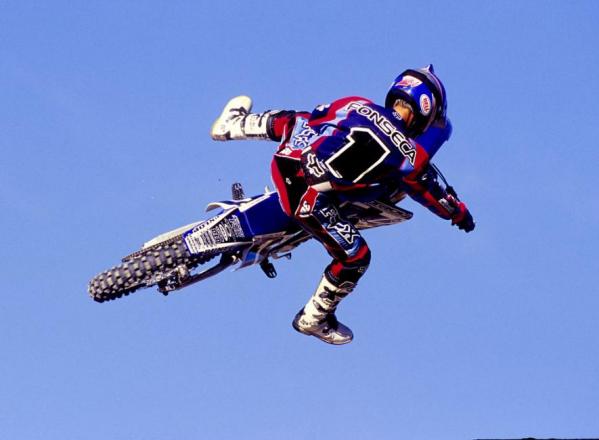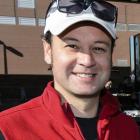After winning two 125 Supercross championships, Fonseca moved up the big bikes, and after a few seasons learning the ropes, Fonseca started to find his groove. By 2005, Fonseca was capable of top-three finishes against the likes of Ricky Carmichael, James Stewart and Chad Reed. But Fonseca’s racing career was tragically cut short in early 2006 when a freak practice crash left him paralyzed from the chest down, and with limited use of his hands.
In the blink of an eye, everything in Fonseca’s life changed.
Racer X: Ernesto, thanks for taking some time to talk with us. We wanted to check in, see how you are doing, and find out what is going on in your world these days.
Ernesto Fonseca: Thanks man, and no worries on chatting with Racer X. Well, I have pretty much been starting just a whole new chapter of my life. I have been focusing on therapy as much as possible and devoting pretty much all of my time and energy to getting my body better. I have been off the racing radar, for the most part. I still follow it, but have been really focused on trying to improve my body.
Tell us a little about your injury, and to what degree your injuries have recovered.
My injury is basically the C6, right about the area where hand dexterity is. I therefore have limited hand movement, and from there down I am paralyzed. However, with my hands, I still have good use of them. I have been driving now for almost a year, which has been a huge improvement for me, and has been really helpful.

Fonseca's career came to an end after a devastating practice crash in 2006 would leave him paralyzed from the chest down.
Photo: Simon Cudby
I am glad to hear that. Do you have a van, or how does that work?
No. I just have a specially outfitted car. I have a lot of help though, and I have a full time caregiver that helps me with a lot of things that might present a challenge. But with the car, what I need help with is getting in and out of it. Also, things like filling up car with gas is a little tricky. We have to plan ahead a lot with our trips, and there is just a lot more to think about when I am out in it. But the car is outfitted with levers that I can push down to go, its pretty simple, just a number of levers that run it.
There seem to be a lot of folks, like Red Bull, who are supporting the research with SCI injuries. I know you were involved a few years back on some of that. What is going on in that field, is there any progress?
Well, it’s really hard, there are not that many of these injuries in society, so it doesn’t get treated as intense as it really is for the individual. But for me, I have stopped paying attention to the medical research side of things. There are just so many different opinions and treatments out there. None of them are the home run that people are looking for. The thing is, each injury is totally different, so nothing is the same. For me, I am now just trying to live my life to the fullest, and best as possible, with what I have.
Are you still working with Answer Racing?
No, I am not working with Answer anymore. They were great to me, and we had fun, but it was time to move on. But I have been helping Troy Lee with some of his international business expansion. Troy is a great friend of mine, and was always a real supporter during my career. But right now, I am more focused on myself than on having a job in the industry. I still do keep in contact with a few people, but not as many people as I used to.

Fonseca won two 125 SX championships during his short-lived career.
Photo: Simon Cudby
Almost every professional racer struggles with that transition from racer to non-racer, or racer to retired racer. In your case, the transition was very sudden. You are now five years into your recovery – can you tell me a little about the mental side of your recovery and transition?
Yeah, for sure. The toughest part, is having that hunger. I was an athlete, and my life was about racing, and getting better and faster. It was devastating getting hurt. For me, it was an immediate 360 in lifestyle. As a racer, you are always asking people for whatever you think you need, and that will make you better. You become such a demanding person, you think it is all about you. You get to the track, your mechanic has the bike there, ready to go, your gear guy is there, your goggle guy is there. All I had to do is arrive ready to fight and be mentally prepared to ride. For me, it was over immediately. It was tough. But you can’t go on forever, no matter who you are. That is what is hard to swallow. Replacing the intense passion and focus, it is just hard to do.
Have you been able to refocus that passion on anything?
Well, I have been focused on my body, and getting better. But outside of that, I have always been a fan of design, so I have been doing some of that. Troy was my first gear sponsor, so he is cool to talk to. He puts so much into the design and details, it is very cool. Troy has the some of the coolest stuff going right now.
But, once you are an athlete, you are always are. You have that mentality. For me, there are only so many things I can do on my own. I borrowed a (pedal) bike from Ricky James and have been doing some of that, which is cool as well.
What is your take on the current state of the sport?
I have been away from the sport for so long, I am not so up to the speed on really what is happening all the time, or the financial side of things. But things are a lot tighter everywhere. I am thankful that I was in it at the right time. It seems like things never change though, the big players are the best, they know how it works, and they are well taken care of. The Reeds, Dungey’s, etc will always be there and will always do well. But the days of the 15th place guy making $150,000 a year are gone. If you pay attention and you have been around, then you know who puts in time. Almost all of the team managers have been in the rider’s shoes at some point, and you can’t trick the system, that is for sure. To be the best, you have to put in the work. It doesn’t matter what year or what the economic situation it is. Guys like Josh Hansen-–those situations make me mad. There is another kid out there who has less and wants it more, but he doesn’t get the shot, and Hansen keeps getting rides.
Speaking of which, hey, whats is J Law up to?
__600.jpg)
Fonseca was also a force on the amateur scence during his brief stints in the States.
Photo: MX Sports Archives
Last I knew he was living back in New Jersey, but not racing. Every now and then an internet video pops up of him riding at some local track, but my personal viewpoint is that he may be done with being a professional racer, from what it appears.
I can see that. When I was racing, I ran a tight program, but whenever you lose the focus, its over. I guess some of those guys are just wired a certain way and they don’t know anything different. It’s tough to get out from that program. At least he is not trying to fool himself. One of the things Carmichael was so good at was blocking out all that stuff. He had people around him that took care of things all around, and Ricky took care of his job, which was winning.
Switching gears a bit, your upbringing was not the traditional American Motocross upbringing. How the heck did a kid from Costa Rica make it big racing Motocross in America?
Well, I was just a little kid racing a 60 and 80 down here in Costa Rica. A guy down here wanted to start a team and travel with the best local riders to the USA so we could get better. That’s how everything got started. I went to the Mini ‘O’s in 1992 and did well. That got the ball rolling. I rode the 7-11 class and on a 60, I won both stock and modified. I got interest from Team Green and Jose Gonzalez, which was really cool. One thing lead to another, and I met a few Americans. A year or two later, I came up, stayed with Pastrana and did the entire Florida winter series. In 1998, I met some new friends and got sponsorship with Oakley, and Scott Taylor. Through Scott, I also met Johnny O’mara, who hooked me up with Yamaha of Troy. I got hired in 1998 by them and turned pro in 1999.
Did you live here in the US full time back then?
No. It was very complicated. I did Loretta’s from 1995 through 1998. I was flying back and fourth from central America, and I was in school. I just traveled a lot. I did three or four races a year in the USA. Sometimes I did others, like Mammoth, but it is hard. Getting the bikes around was always complicated, and the guys from BSY would drive around all over the place. Also, I was in school, and I never really got to practice as much as I wanted to. But, if I look at the bright side, it was good to travel as much as I did because I got to practice my English. My parents do not speak English, so I had to handle it all.
__600.jpg)
Born and raised in Costa Rica, Fonseca had a steep learning curve on and off the track.
Photo: MX Sports Archives
You had a great relationship with Tony Gardea, who has managed several top riders over the years, including Ryan Dungey and James Stewart, and most recently Dean Wilson. Since your parents were not here, how important was that relationship?
I didn’t start working with Tony until later in my career. But I had some bad experiences along the way, and I never really trusted anyone until I met Tony. I wish he would have been around earlier on, and I could have done things differently. It would have helped me to have a better understanding on the proper business affairs. My mom and dad were not around, and early on I was dealing with contracts, and I didn’t know what I was doing. The factory would call me direct, and I didn’t know what to say! Doing that stuff takes so much out of you. For sure it is hard to find that right person, someone that understands about racing and all the details, but Tony was a great friend.
So what do you think of what Chad Reed is doing with his own team and program?
I admire Chad a lot. He is such a great rider, and has dealt with so many different situations. He has handled them all really well. And, he is an international rider that has done it all. He has won every title there is to win. The people around him are good, and he has made some really good money, so that doesn’t hurt. This year he was a title contender, and to do all that on our own, have a semi, your own mechanics, it is just tough. But the thing I have found, man, when the ball gets rolling, it is so easy. You just carry your momentum and keep rolling.
Well, Ernesto, lets wrap this up. Anything you want to close with?
Well, the people that know me and that are true friends know what I am after, and am thankful that I can just focus on improving my situation [long pause]. Also, I will always remember the winning days, those were happy moments. You never forget those. What I learned was working with true professionals, guys like Cliff White, and them just teaching you to be a good individual and good person. Kenny [Germain] was awesome, he worried himself so much! I think he was proud. We got two championship in that class. My other mechanic, Gothic, he was awesome as well, just a total professional. Thanks for doing this.
Have a rider you want to see profiled? Drop me a line at nick@mxsports.com. And if you have contact information, that is a big help!

_.jpg)


